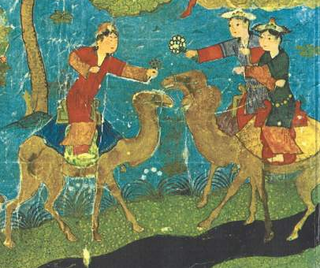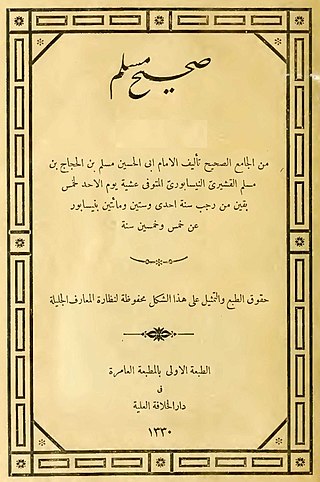
In Islam, a houri, is a maiden woman with beautiful eyes who is described as a reward for the faithful Muslim men in paradise.

Abū ʿAbd Allāh Muḥammad ibn Ismāʿīl ibn Ibrāhīm al-Juʿfī al-Bukhārī was a 9th-century Muslim muhaddith who is widely regarded as the most important hadith scholar in the history of Sunni Islam. Al-Bukhari's extant works include the hadith collection Sahih al-Bukhari, al-Tarikh al-Kabir, and al-Adab al-Mufrad.
Al-Ikhlāṣ, also known as the Declaration of God's Unity and al-Tawhid, is the 112th chapter (sūrah) of the Quran.
Al-Kawthar is the 108th chapter (sūrah) of the Quran. It is the shortest chapter, consisting of three ayat or verses:
Al-Falaq or The Daybreak is the 113th and penultimate chapter (sūrah) of the Qur'an. It is a brief five ayat (verse) surah, asking God for protection from evil:
Al-Fīl is the 105th chapter (surah) of the Quran. It is a Meccan sura consisting of 5 verses. The surah is written in the interrogative form.
At-Tawbah is the ninth chapter of the Quran. It contains 129 verses and is one of the last Medinan surahs. This Surah is known by two names, At-Taubah and Al-Bara'at. It is called At-Taubah in light of the fact that it articulates taubah (atonement) and informs about the conditions of its acceptance.. The name Bara'at (Release) is taken from the opening word of the Surah.
Ash-Shu‘ara’ is the 26th chapter (sūrah) of the Qurʾan with 227 verses (āyāt). Many of these verses are very short. The chapter is named from the word Ash-Shu'ara in ayat 224. It is also the longest Meccan surah according to the number of verses.
The Hypocrites is the 63rd chapter (surah) of the Qur'an, with 11 verses. Almost all of the chapter is preserved in the Ṣan‘ā’1 lower text.
At-Taḥrīm is the 66th Surah or chapter of the Quran and contains 12 verses (ayah). This Surah deals with questions regarding Muhammad's wives.
Al-Qiyama or Al-Qiyamah, meaning "The Resurrection", or "The Rising of the Dead", is the seventy-fifth chapter (sūrah) of the Quran, with 40 verses (ayah).

Sahih al-Bukhari is the first hadith collection of the Six Books of Islam. Compiled by Islamic scholar al-Bukhari in the musannaf format, the work is valued by Muslims, alongside Sahih Muslim, as the most authentic after the Qur'an.

Sahih Muslim is the second hadith collection of the Six Books of Sunni Islam. Compiled by Islamic scholar Muslim ibn al-Ḥajjāj in the musannaf format, the work is valued by Sunnis, alongside Sahih al-Bukhari, as the most important source for Islamic religion after the Qur'an.

Sunan Abi Dawud is the third hadith collection of the Six Books of Sunni Islam. It was compiled by Persian scholar Abu Dawud al-Sijistani.
A famous recorded oral tradition among Muslims is about comment made by Imran ibn Husain, one of the companions of Muhammad and a Narrator of hadith. The comment was regarding the prohibition of Mut'ah, a word with several meanings. It is used in both Nikah mut'ah and Mut'ah of Hajj.

Humour in Islam refers to the act of doing things that are considered humorous under the guidelines set by the Quran and the Islamic prophet Muhammad.
Miracles of Muhammad are miraculous claims attributed to the Islamic prophet Muhammad.
Al-Masad (Arabic: المسد, is the 111th chapter of the Quran. It has 5 āyāt or verses and recounts the punishments that Abū Lahab and his wife will suffer in Hell.

The signs of the appearance of the Mahdi are the collection of events, according to Islamic eschatology, that will occur before the arrival of the Mahdi, The signs differ based on Sunni and Shia branches of Islam.
Muhammad Tawfiq Sidqi was an Egyptian Islamic scholar who argued against the authenticity of hadith. He is remembered today for his argument "that nothing of the hadith was recorded until after enough time had elapsed to allow the infiltration of numerous absurd or corrupt traditions"; and that God had allowed this to happen because the Sunnah of Muhammad as a whole "was only ever meant for the Arabs of the Prophet's time", as only the Quran was necessary for Islam,. Sidqi recanted his position after Rashid Rida opposed his position.







